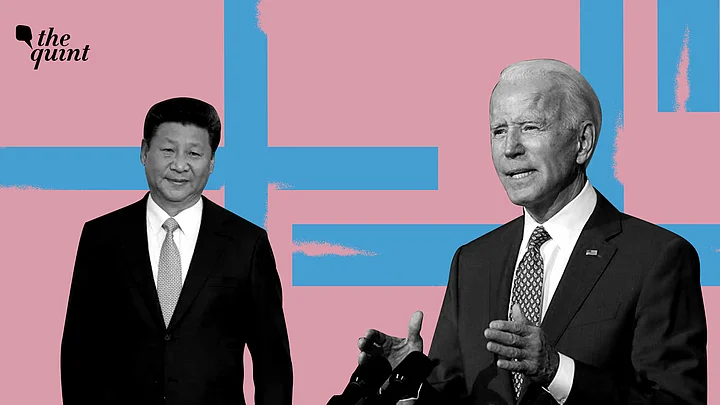There were no serious fumbles or stumbles as widely feared. President Joe Biden, the oldest man to occupy the Oval Office at 78, conducted his first and much-anticipated press conference with relative aplomb, made news on Afghanistan, revealed his true feelings about China and delved into the gathering immigration crisis without setting the media world on fire.
Yes, he used notecards for help and called on ten pre-selected reporters, some of whom asked badly framed questions or repeatedly the same question as if the intent were not to make news.
Yes, he made gaffes – Biden seemed to refer to Afghan President Ashraf Ghani as “Kayani.” A Freudian slip involving the name of one of Pakistan’s former army chiefs captures the Af-Pak dynamic perfectly.
At times he seemed to lose his train of thought and seemed to mangle sentences (“…those other nations that have NATO allies who have troops in Afghanistan as well”). At others, he seemed to be searching for a way out of a verbal cul-de-sac.
In the end, the narrative of Biden’s “cognitive decline” pushed by Fox News anchors and other right wing media wasn’t corroborated by reality. But it won’t stop the constant questions from that eco system about whether he is “all” there.
What Joe Biden Said on Troop Withdrawal from Afghanistan
During the hour-long appearance, Biden came across as “regular Joe” – somewhere between the ferocious and antagonistic Donald Trump who hated the press and the cool and professorial Barack Obama who tolerated the press.
Biden was informal, normal and even impatient at times, like when faced with the question whether he would run again for president. With hundreds more deserving topics on which to pin down a US president, the elite journalist summoned up a dud.
The questions on foreign policy elicited the most news. When asked about the deadline for US troops to leave Afghanistan as agreed in the deal made by the Trump Administration, Biden said it was “going to be hard to meet the May 1 deadline just in terms of tactical reasons.”
That means US troops are most likely staying on beyond May Day but probably will return home before year-end.
Biden said he couldn’t “picture” troops being there next year. “We have been meeting with our allies… And if we leave we’re going to do so in a safe and orderly way,” he said.
Both Secretary of State Antony Blinken and Defence Secretary Lloyd Austin have taken a measure of European and Asian allies and partners on the Afghanistan peace process during their visits over the last 10 days. Austin went on an unannounced visit to Kabul from New Delhi. Blinken has come up with a plan for an interim government, which includes the Taliban, but the idea was firmly rejected by Ghani.
How Joe Biden ‘Let Go’ and Revealed His Feelings About China & Xi
On China, Biden let go and essentially laid his feelings bare. He said Beijing’s goal was to achieve complete dominance, something most world leaders avoid saying in so many words. They prefer to skip around the bush. “They (China) have the overall goal to become the leading country in the world, the wealthiest and most powerful country in the world,” said the US president.
And then came the punch line: “That is not going to happen on my watch, because the United States is going to grow and expand.” Biden framed the competition with China as one between a democracy and an autocracy. “That is what is at stake, not just in China. Look around the world… we gotta prove democracy works.” The world can say “Amen” to that.
Biden said he had spent the longest time of any world politician with Chinese President Xi Jinping when the latter visited the US during the Obama Administration. He called Xi “a smart, smart guy” but one with not a democratic “bone in his body” who believes democracies can’t handle the complexities of modern existence.
Why Vladimir Putin Won’t be Amused by Biden’s Statements
Biden compared Xi to Russian President Vladimir Putin and said they both thought autocracy was the “wave of the future.” With this, the US president has started on a testy note with both major rivals but how Washington manages relations with both remains to be seen.
The most recent interaction between Biden and Xi was a two-hour phone conversation after the US leader had talked to all major allies and partners.
Senior US officials say the challenge of China has to be fought on multiple levels – technology, education, pharmaceuticals and of course, military. Biden elaborated on the message, saying he will ramp up investment in science and technology, which as a percentage of GDP has dropped dramatically in the US in recent years. A major funding increase is expected in the areas of biotech, artificial intelligence, quantum computing and other industries.
Biden to Benefit From Bipartisan Consensus on China in US
“China is out-investing us by a long shot because their plan is to own that future,” Biden said in a clear acknowledgement that the US had some catching up to do to stay as number one.
China as the foremost challenge facing the US is an idea that rings true among both Democrats and Republicans. Biden will be the beneficiary of this bipartisan consensus but how he implements his strategic response over the next four years will hold the key.
What’s key is that his team is young, smart and ready to work hard. Even if he may need notecards, they certainly don’t because they know their brief well.
(The writer is a senior Washington-based journalist. She can be reached at @seemasirohi. This is an opinion piece and the views expressed are the author’s own. The Quint neither endorses nor is responsible for them.)
(At The Quint, we question everything. Play an active role in shaping our journalism by becoming a member today.)
